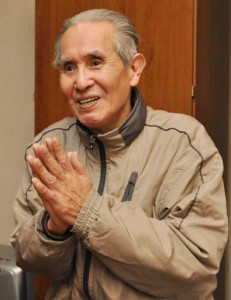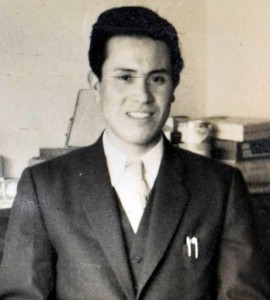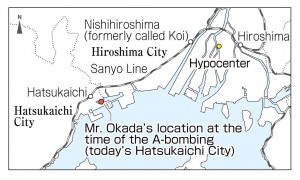Ryogo Okada, 81, Otake City, Hiroshima
Jan. 27, 2015
Carried countless bodies in the A-bomb aftermath
by Yuji Yamamoto, Staff Writer
In the afternoon of August 6, 1945, the day the atomic bomb exploded above the city of Hiroshima, Ryogo Okada, 81, passed a cup of water to survivors pleading for a drink. To show their appreciation, they put their hands together in a sign of gratitude. Mr. Okada was 12 back then, but the faces of these survivors are seared into his memory. At the time, he lived in Hatsukaichi, about 11 kilometers southwest of the hypocenter. On the day after the bombing, he ventured into the charred city and helped carry the dead. The boy who experienced the horror of war firsthand became an adult who began to convey to schoolchildren the importance of lending support to other people.
At the time of the bombing, Mr. Okada was a first-year student at Hiroshima Prefectural Hatsukaichi Engineering School (today’s Hatsukaichi High School). He was in his classroom when there was a bright flash of light. He felt this light, and heat, on one side of his face. This was followed by a great boom which shattered the windows of the classroom. Looking toward Hiroshima, he saw a huge mushroom cloud rising into the air. He first fled to the bomb shelter which had been dug on the school grounds, then, after being instructed to return home, went to the nearby tatami mat shop, where he was lodging.
Around 3 or 4 p.m., he saw survivors who were wounded walking on the road in front of the shop, many of them barefoot. They were bloodied, with fragments of glass piercing their faces and bodies, their arms burned. When they pleaded for water, the shop owner and Mr. Okada put some well water in a cup and gave it to them. Before they went on, they put their hands together and expressed their thanks.
Prior to that, when Mr. Okada was a student at a national school, he admired the suicide attack units and applied to the army preparatory unit for boys to become airmen. Looking back on the day of the atomic bombing, he said, “I understood that something terrible had happened in Hiroshima. My hatred of the United States grew even stronger and I wanted so badly to defeat them.”
After a sleepless night, he and his classmates, following orders from his school, went to Honkawa National School (today’s Honkawa Elementary School in Naka Ward). Around 7 a.m., he boarded a freight train at Hatsukaichi station and got off at Koi station (today’s Nishihiroshima station in Nishi Ward). When he walked to Koamicho (part of today’s Naka Ward), he could gaze upon the entire burnt-out city center. The sight of only strongboxes scattered here and there amid the rubble left a strong impression.
Near the hypocenter, charred bodies and other victims with burnt backs were pulled out from the Motoyasu River and Honkawa River. Working together, Mr. Okada and seven classmates picked up a countless number of bodies and carried them to the grounds of Honkawa National School. “What a despicable thing the United States has done to us,” he thought.
Mr. Okada’s brother Kengo, who was two years older and a student at Hiroshima Second Prefectural Junior High School (today’s Kanon High School), experienced the atomic bombing in Koi, but managed to return safely to their home in Asahara (now part of Hatsukaichi). At first, because his brother’s whereabouts were unknown, Mr. Okada searched for him at his boarding house around August 9 or 10 and took his trunk back to Asahara.
Afterward, rumors spread in Asahara that “A-bomb survivors could infect us with radiation.” Afraid of discrimination, Mr. Okada burned the clothing he had worn at the time and his brother’s trunk. He kept quiet about his experience of the bombing. In 1997, after more than half a century had passed, he finally applied for the Atomic Bomb Survivors Certificate at the urging of a former classmate.
He married his cousin Akiko, 80, in 1957, and they moved to the city of Otake. While running a news stand, he served as the president of the PTA at the local elementary school. With the hardships of war in mind, including the hunger he suffered from a lack of food, he told the students at their graduation ceremony, “I hope you will be the kind of person who lends a helping hand to small children and the elderly.”
Even today, whenever Mr. Okada is in Naka Ward, crossing Aioi Bridge on a streetcar, he puts his hands together and prays for the repose of the A-bomb victims’ souls. “I experienced the horror of the atomic bomb firsthand. It must never be repeated,” he stressed.
Teenagers’ Impressions
Thankful for the chance to study
Ryogo Okada is my grandfather and he told my older sister and me about his experience of the atomic bombing in a quiet voice. At the time, he was just one grade lower than I am now. He must have been so sad to witness such horrible scenes. If I were him, I would be too afraid to carry the bodies, like he did. Because I heard he didn’t have the chance to attend school as much as he wanted, I’d like to be thankful for the opportunity we have today to study, which is something we take for granted. (Terumi Okada, 14)
My grandfather’s experience is unimaginable
This was the first time I heard my grandfather’s experience of the atomic bombing in detail. The fact that he had to carry a lot of bodies, when he was still a small boy of 12, is unimaginable to me, because I only know him as always kind and in good health. This year marks the 70th anniversary of the atomic bombing, and the number of survivors able to speak about their experience continues to decline. I would like to listen to more stories from the survivors, and more of my grandfather’s story, and convey to others the horror of the atomic bombing. (Harumi Okada, 15)
Dreadful that people choose to die
Mr. Okada’s comment that he hated the United States after the atomic bombing and wanted more badly to see them defeated, even through suicide attacks, left a strong impression on me. If he had been able to pass the screening for the airmen training and become part of the suicide attack unit, both of his grandchildren, Harumi and Terumi, might not even be alive now. I think it’s so sad. To me, war is a dreadful thing because people are choosing to die of their own free will and many innocent lives are lost. (Maiko Hanaoka, 16)
(Originally published on January 26, 2015)










